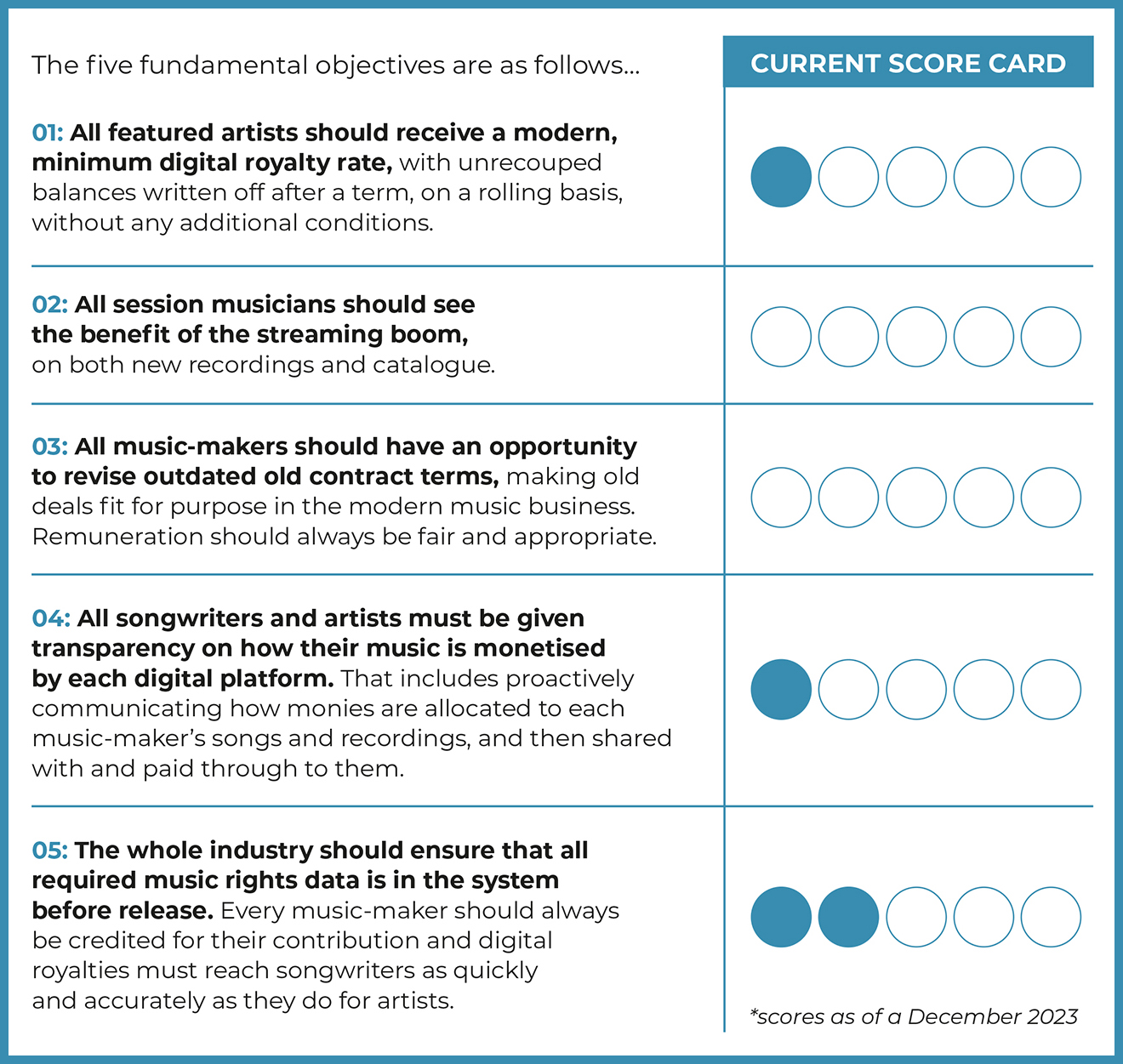TUESDAY 12 DECEMBER 2023
This is an end-of-year update on the economics of music streaming work that was initiated by the 2021 inquiry in the UK Parliament.
————————————————
THE STORY SO FAR
In July 2021, the Digital, Culture, Media & Sport Select Committee in the UK Parliament published a major report on the economics of music streaming following an in depth inquiry.
In that report, MPs highlighted many issues for music-makers with the way the music streaming business is currently run and called for a “complete reset”. They also proposed a number of copyright law reforms that would address some of the issues raised.
In response, the UK government urged the music industry to find voluntary solutions to each issue, while also commissioning research into the proposed copyright reforms. To help with that process, the Intellectual Property Office convened a contact group of music industry representatives and two working groups to focus on transparency and data issues.
That work has been ongoing throughout 2022 and 2023. All five members of the Council Of Music Makers have actively participated, coordinating those efforts via CMM.
To help clarify the primary objectives of the music-maker community, in March 2023 we published five fundamentals that all parties should seek to achieve. We also gave each objective a mark out of five to help track how close we are to achieving it. As we reach the end of 2023, we have now updated those scores.

Clearly there is still a lot more work to be done. However, while progress is slow, we are moving in the right direction. Work is now underway to actively achieve some of our objectives. And a forum is in place to agree a plan of action for achieving the others.
CMM would like to thank the Intellectual Property Office and Department For Culture, Media & Sport for their ongoing and unwavering commitment and support in helping us meet our objectives as an industry. We also greatly appreciate the time, energy and expertise of those streaming services and music companies that have engaged with this process.
And we greatly thank the Culture, Media & Sport Select Committee in Parliament whose inquiry and report made this entire project possible – and whose ongoing scrutiny and diligence is crucial for ensuring our objectives can be achieved.
————————————————
FUNDAMENTALS 1-3: REMUNERATION + CONTRACTS
The first three fundamentals relate to music-maker remuneration and contracts. This remains the most important strand of this work, but it is the strand where there has been the least progress.
Most of the copyright law reforms proposed by the Select Committee relate to these issues. The Intellectual Property Office commissioned three pieces of research in relation to those proposed reforms. Two of the three reports were published earlier this year.
In May, the UK government announced that it would convene a working group to discuss music-maker remuneration. However, this working group is yet to meet, and no details have been published regarding its membership or terms of reference.
We know that ministers are keen for all of the research commissioned by the IPO to be published before this working group meets. While we recognise the value of this research, it is becoming increasingly urgent for this working group to begin discussions.
It is now two and half years since the Select Committee called for a “complete reset” of the streaming business – with music-maker remuneration the biggest concern – and yet there has been no progress in this domain.
We have known from the start that many record companies – including all three majors – oppose the copyright reforms proposed by the Select Committee.
The CMM has been clear throughout that a voluntary industry agreement could also address many of the issues around music-maker remuneration. However, the record industry is yet to come forward with any proposals for what could be in that agreement.
————————————————
FUNDAMENTAL 4: TRANSPARENCY
The government convened a working group to consider transparency issues and the whole music industry engaged with this process.
As a result, a transparency code has been agreed which should be signed at the start of 2024. It includes commitments in relation to music-maker contracts and royalty payments, and to provide more information to music-makers regarding the basics about how key digital services are monetising their music.
Although the code is very much a compromise and therefore just a first step forward, we welcome the commitments that have been made, and look forward to collaborating with streaming services, record labels, music distributors, music publishers and collecting societies in putting the code into action in 2024.
CMM will also run a webinar in February open to members of all five CMM organisations to provide an overview of how this code will work.
However, the score for the fourth fundamental has actually dropped by one point in recent months. Both Deezer and Spotify have recently made changes to the way they calculate royalties with zero consultation of the music-maker community.
Crucial decisions about how music-makers get paid were made unilaterally and in secret by the streaming services and the major rightsholders. And those decisions have only been communicated to music-makers through short press releases and blog posts.
Meanwhile, we know that the major rightsholders are in talks with tech companies regarding opportunities around generative AI. Again, there has been zero consultation with the music-maker community about these opportunities.
Questions about AI raised by CMM through UK Music in July remain unanswered. And a number of music-makers and managers have also directly contacted the major labels and publishers they work with seeking information about their strategies and policies around AI. Those requests for information have been overwhelmingly ignored.
Which means that – although the transparency code is a big achievement and we look forward to putting it into action next year – unfortunately there is currently less transparency for music-makers in the digital music market today than there was when MPs published their report in July 2021.
————————————————
FUNDAMENTAL 5: META-DATA
The government convened a working group to consider metadata issues and the whole music industry engaged with this process.
As a result, a data code was signed and published in May 2023. The aim of this work is to provide more extensive credit information, and an ISWC that identifies the song, whenever new recordings are delivered to streaming services.
Two expert groups have now been convened, one focused on technical issues and one on education, and the IPO has commissioned a piece of research to consider the processes for getting more metadata into the system, and to identify key performance indicators that will assess the impact of this work.
Again, the metadata code is a first step forward, and the CMM hopes for stronger commitments across the digital supply chain in the future.
However, it is an important first step. And we are positively engaging with the expert groups to ensure that all stakeholders – including music-makers and their managers – are committed and able to collate and deliver the key metadata that is required.
CMM will run a webinar in February open to members of all five CMM organisations that will provide an overview of this work and explain how music-makers can play their part in ensuring the code succeeds.
We will also closely monitor this ongoing work in order to update the members of CMM organisations and to hopefully increase the current score of 2/5 as key milestones are passed.

